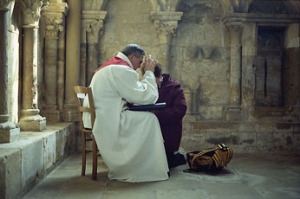In Part 1 of this series on the Sacraments we learnt that Baptism takes away our original sin, all personal sins and all punishment due to those sins. However, it does not take away our tendency, due to human weakness, to sin.
When we commit a sin – any sin – we offend God’s honour and love, damage our relationship with him and with his Church.
Thus “Those who approach the sacrament of Penance obtain pardon from God’s mercy for the offense committed against him, and are, at the same time, reconciled with the Church which they have wounded by their sins and which by charity, by example, and by prayer labors for their conversion.” (Catechism of the Catholic Church 1422).
Only God can forgive our sins and as such, our ‘Lord instituted this sacrament on the evening of Easter when he showed himself to his apostles and said to them, “Receive the Holy Spirit. If you forgive the sins of any, they are forgiven; if you retain the sins of any, they are retained.” (John 20:22-23)’ (Compendium to the Catechism of the Catholic Church, 298).
The Seal of Confession
Because this is a delicate ministry, and keeping in mind the dignity of all human persons ‘every priest who hears confessions is bound under very severe penalties to keep absolute secrecy regarding the sins that his penitents have confessed to him.’ (Catechism of the Catholic Church, 1467)
Further to this, Jesus is working through the person of the priest, you are actually encountering Jesus in this sacrament.
Realising that we are encountering our Lord in the sacrament should also help us to make regular use of Confession because he wants to heal, strengthen and encourage us to be more like him. Regardless of our sins, he still loves us unconditionally.
The sacrament of Confession is also referred to as the sacrament of Penance, the sacrament of Reconciliation, the sacrament of Forgiveness and the sacrament of Conversion. Each of these names details one of the five aspects of this wonderful sacrament.
Confession
Confessing our sins is an essential element of this sacrament. Here we are acknowledging that we have made mistakes but we also ‘confess’ the wonder of God’s mercy for the sinner.
Penance
An important part of this sacrament is the concept of interior penance or a ‘contrite heart’. This is where we respond to the merciful love of our Heavenly Father by the feelings of sorrow and loathing for the sins we have committed, as well as a firm resolve not to sin again in the future with the help of God.
The priest will also ask us to complete some acts of penance, usually in the form of prayer. Penance however, can also be expressed by fasting and almsgiving – experienced more readily during the season of Lent.
Reconciliation
Through this Sacrament we are reconciled to God and also to his Church.
Forgiveness
Through the priest’s sacramental absolution of the penitent, God grants his ‘pardon and peace’ to us.
Conversion
Jesus is always calling us to conversion, to turn back to the Father and to turn away from sin. We are, and will always, struggle to lead lives of grace because we have an inclination to sin, but through our regular reception of this sacrament we are realigning our bearings towards holiness and eternal life.
Making a good Confession
As Catholics we are called to confess our sins at least once a year, this is the bare minimum. However, if we are really keen to come to know and love God better then we should endeavour to go once a month.
But it is no good to go once a month if we do not make a good Confession. And how do we do that?
‘When we go to Confession we need to (i) examine our conscience; (ii) have contrition; (iii) confess our sins; (iv) receive absolution; and (v) do penance.’ (Gift of Confession, pp 137)
First of all, we need to prepare well by examining our conscience – a guide on how to go about this can be found here. Following a good preparation, the Confession of our sins in the Sacrament will be much easier and much more thorough.
We also need to be really sorry for what sins we committed and detest the sins themselves. The with God’s help we must make a firm and genuine promise not to sin again in the future.
Finally, we must make reparation for our sins, carrying out the penance that our confessor asks of us.
Taking the time to ensure we make a good Confession will help us, not just today, but in the future as well as we strive to be holy and spend eternity with our Heavenly Father.
First published in In Sight Magazine.
Originally posted 2014-10-27 22:52:24.


The link to “examining our conscience” seems to be broken?
I just checked, it appears to be working now. Is it working for you?
Sorry Sarah it still doesn’t work for me …
It takes me to this url
https://australiancatholicmums.com/examining-your-conscience/#.VFIi0KAzHqB
But it says it can’t find any content.
Never mind, it is probably just a bug in my browser.